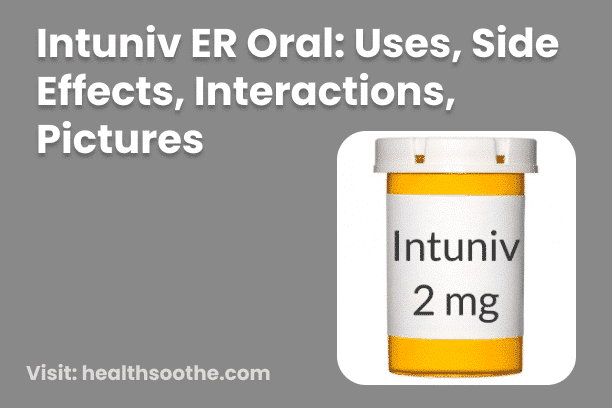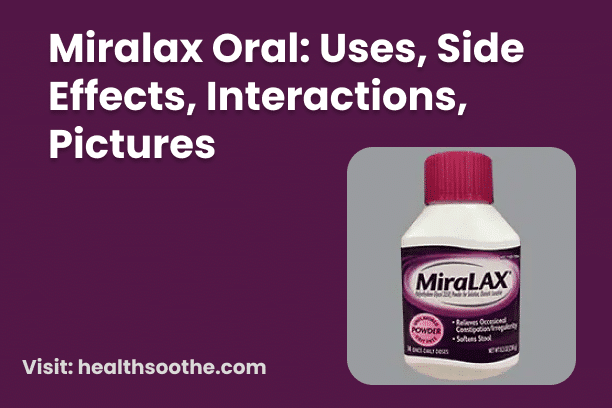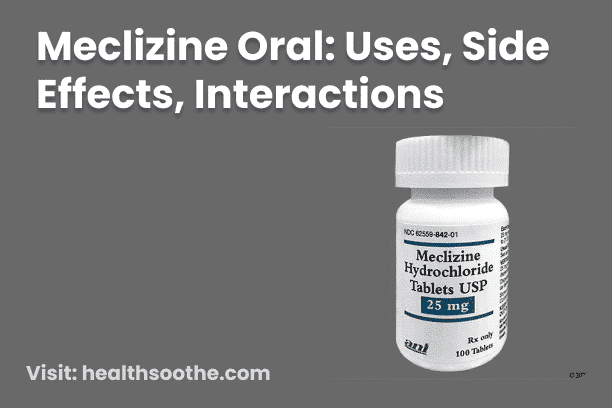This medication is employed for treating attention deficit hyperactivity disorder (ADHD) as part of a comprehensive treatment plan that encompasses psychological, educational, and social interventions. Diverging from other medications used to address ADHD, guanfacine does not function as a stimulant.
The precise mechanism of guanfacine's action in treating ADHD remains unknown. It is speculated that guanfacine influences receptors in specific brain regions, fostering the enhancement of working memory, minimizing distractions, and bolstering attention and impulse control.
Guanfacine may contribute to alleviating ADHD symptoms, including disruptive behaviour, inattention, hyperactivity, impulsivity, conflicts with adults or outbursts of anger.
How to Use Intuniv:
Review the Patient Information Leaflet given by your pharmacist prior to initiating guanfacine treatment each time you refill your prescription. If you have any queries, consult your doctor or pharmacist.
Take this medication orally as directed by your doctor, typically once daily in the morning or evening. Avoid consuming it with a high-fat meal, as this can augment drug absorption and lead to heightened side effects. Ingest the tablet whole; refrain from crushing, chewing, or splitting it, as such actions can cause the rapid release of the entire drug content, increasing the risk of adverse effects.
Do not switch between various forms of this medication without consulting your doctor, as different forms might not deliver the same guanfacine dosage.
Adhere to your prescribed dosage meticulously. The dosage is contingent on your medical condition, weight, response to treatment, and concurrent medications. Make sure to inform your doctor and pharmacist about all the products you use, including prescription drugs, nonprescription drugs, and herbal supplements.
To mitigate the likelihood of side effects (like low blood pressure, slow heart rate, and drowsiness), your doctor might initiate therapy with a low dose, subsequently titrating it upwards. Comply diligently with your doctor's instructions. Do not adjust your dose without medical guidance.
Taking more or less medication than prescribed or altering the frequency of administration can impede your progress and heighten the risk of adverse effects. Adhere to a consistent daily schedule for medication intake.
Discontinuing this medication without consulting your doctor is not recommended. Abrupt cessation might exacerbate certain conditions. You could experience symptoms such as headaches, nervousness, restlessness, tremors, rapid heart rate, and elevated blood pressure. To mitigate these symptoms during the discontinuation process, your doctor may advocate a gradual reduction of your dose. Seek additional details from your doctor or pharmacist. Promptly report any emerging or worsening symptoms.
Inform your doctor if your condition persists or deteriorates.
Read Also: Sulfathiazole: Uses, Interactions, Mechanism of Action
How long does Intuniv ER Oral stay in your system?
Intuniv ER (Extended-Release) oral medication contains guanfacine, and its duration of stay in the body can vary based on factors like individual metabolism, dosage, and other physiological characteristics. Generally, guanfacine has a half-life of around 17 hours, which means it takes approximately 4 to 5 days for the medication to be mostly eliminated from your system.
However, it's important to note that traces of the drug can still be detected in your system for a longer period, especially if you've been taking it for an extended duration. If you have concerns about how long Intuniv ER stays in your system for a specific reason (e.g., drug testing, interactions), it's recommended to consult your healthcare provider for personalized information.
Side effects
Possible side effects of this medication encompass drowsiness, dizziness, dry mouth, constipation, tiredness, nausea, headache, and stomach pain. Should any of these effects persist or worsen, promptly inform your doctor or pharmacist.
To mitigate the risk of dizziness and lightheadedness, take care to rise slowly from a seated or lying position.
To alleviate dry mouth, consider sucking on sugarless hard candy or ice chips, chewing sugarless gum, drinking water, or utilizing a saliva substitute.
Bear in mind that your doctor has prescribed this medication after evaluating that its benefits surpass the potential risks of side effects. Numerous individuals employing this medication do not experience severe side effects.
If you encounter any severe side effects, such as a slow heartbeat, fainting, or alterations in mental/mood (like depression, hallucinations, or thoughts of suicide), promptly notify your doctor.
Although a severe allergic reaction to this medication is uncommon, seek immediate medical assistance if you observe any signs of a serious allergic reaction, including rash, itching or swelling (particularly of the face, tongue, or throat), intense dizziness, or difficulty breathing.
The aforementioned list does not encompass all potential side effects. If you encounter effects not mentioned above, get in touch with your doctor or pharmacist.
Precautions
Prior to taking guanfacine, communicate with your doctor or pharmacist if you are allergic to it or if you have any other allergies. This product may contain inactive ingredients that could lead to allergic reactions or other complications. Seek further information from your pharmacist for more clarity.
Before initiating this medication, inform your doctor or pharmacist about your medical history, particularly if you have kidney disease, liver disease, a history of fainting, blood pressure issues (both low and high), heart disease (such as slow heart rate), or a personal/family history of mental/mood disorders (such as bipolar disorder, depression, or thoughts of suicide).
This medication might cause dizziness or drowsiness. The consumption of alcohol or marijuana (cannabis) could intensify dizziness or drowsiness. Refrain from activities requiring alertness until you can safely engage in them. Abstain from alcoholic beverages. If you use marijuana (cannabis), discuss it with your doctor.
To mitigate the risk of dizziness and fainting, avoid dehydration or overheating during physical activity, particularly in warm weather. If you experience dizziness, sit or lie down.
Before undergoing surgery, inform your doctor or dentist about all the products you are using, including prescription drugs, nonprescription drugs, and herbal products.
Children may be more susceptible to the side effects of this drug, particularly hallucinations and mental/mood changes.
Older adults might be more prone to the side effects of this drug, especially dizziness (especially upon standing), drowsiness, slow heart rate, or depression. Dizziness and drowsiness can heighten the risk of falling.
During pregnancy, use this medication only if it is clearly necessary. Discuss the potential risks and benefits with your doctor.
It is unclear whether this medication is excreted in breast milk. Consult your doctor prior to breastfeeding.
Interactions
Drug interactions can alter the functioning of your medications or heighten the risk of severe side effects. This document does not encompass all potential drug interactions.
Maintain a comprehensive list of all the products you are using, which includes prescription and nonprescription drugs as well as herbal products.
Share this list with your doctor and pharmacist. Avoid initiating, discontinuing, or altering the dosage of any medications without the explicit approval of your doctor.
Notify your doctor or pharmacist if you are concurrently using other products that induce drowsiness, which includes alcohol, marijuana (cannabis), antihistamines (such as cetirizine, diphenhydramine), medications for sleep or anxiety (such as alprazolam, diazepam, zolpidem), muscle relaxants (such as carisoprodol, cyclobenzaprine), and opioid pain relievers (such as codeine, hydrocodone).
Evaluate the labels on all your medications, such as allergy or cough-and-cold products, as they could contain ingredients that lead to drowsiness. Seek advice from your pharmacist regarding the safe usage of such products.
Dosage
Missed Dose:
In case you miss a dose, take it promptly upon recollection. If the next dose is approaching, forgo the missed dose and adhere to your regular dosing schedule. Avoid taking a double dose to compensate for the missed one. If you skip more than two consecutive doses, contact your doctor to establish a new dosing regimen.
Storage:
Preserve at room temperature, safeguarded from light and moisture. Refrain from storing in the bathroom. Keep all medications out of the reach of children and pets.



